- Home
- Ian Mcewan
The Ploughman’s Lunch Page 2
The Ploughman’s Lunch Read online
Page 2
Jeremy! How fantastic.
JEREMY. Darling Susan.
SUSAN. You’re so famous now.
JEREMY. And you’re so beautiful. What are you doing here?
SUSAN. We’re thinking of doing this current affairs thing for schools. World history since 1945. Twelve programmes, lots of stock film.
JEREMY. In that case, you should meet my very dear friend, James Penfield. Brilliant analyst of recent history, and a world authority on the Berlin Airlift.
James and Susan say ‘Hi’ and shake hands.
SUSAN. Was that your chapter, then? It was very good.
JAMES. Thank you. We met last week, at the Wajda film. You won’t remember. We didn’t actually speak.
SUSAN (not remembering). Yes, that’s right. And look, I’m being terribly rude. Bob? Oh, Bob. This is Bob Tuckett. Bob was at Oxford too.
Bob, Jeremy, James all say ‘Hi’. Momentarily enthusiasm flags, no one speaks. Then the drinks tray is suddenly in their midst and they all reach out thankfully, with mock groans of relief and surprise.
An hour later. Guests are leaving. James has got Susan alone. They descend the stairs. Close in on Susan. A desperate kind of seriousness.
I mean, in many ways I’m right behind the women’s movement. But sometimes I wish they’d get on with it instead of moaning on. The office was split right down the middle. I mean, as a woman I understood what they were saying, that current affairs was all about what men did, but as a human being and a television researcher, as a professional, I could just sense they’d got it all wrong. I could see there were two paths I could go down, power or not-power. Down the not-power path was lots of sisterly feeling, masochism and frustration. Down the other path, I could keep on working. So of course I voted with the men and the other women all resigned. I think they’re mad, don’t you?
They arrive by the front door. There is the briefest pause. James makes his bid.
JAMES. Can I give you a lift?
SUSAN. No, it’s all right. I can get a cab. Night night.
James stands in the doorway and watches her go.
8. Exterior. Oxford Circus. Day.
An abrupt transition. Morning rush hour, Brixton Underground station to Oxford Circus. James fights his way through the crowd up the Underground steps leading to the street. He is late.
9. Exterior. Langham Place. Day.
James runs away from the camera towards Broadcasting House.
10. Interior. News Conference Room. Day.
Same time. Moulded plastic chairs are ranged along the walls of the room. Some journalists stand, some are half asleep. The feel of a morning assembly.
Seated at the only desk, by the door, sits the Editor-in-Chief. While waiting he pretends to look at papers.
The tone of these meetings is restrained, weary.
The Editor speaks with short pauses between each point. Quietly, as though talking to himself.
EDITOR. Use of this word ‘finally’. We’ve had this one before. Difficult when it gets . . .
James comes in. The Editor ignores him pointedly. There are no more seats. James stands somewhere inconspicuous.
. . . when it gets too close to ‘finally the main points of the news’ . . . Now today. Not a very sexy list. We can’t live off all these court cases . . . Royals . . . What’s Charles giving Diana for her birthday?
1st JOURNALIST. He’s not telling.
EDITOR. Better follow him around, I suppose.
2nd JOURNALIST. Newcastle is following Charles to see if anyone throws a bottle at his car like last time.
EDITOR. Good . . . Now, I’m going to drop this panda business unless something happens soon.
2nd JOURNALIST. We’ve got two people down at the zoo looking into the cage.
EDITOR. Give it one more day. These scrap iron merchants on, where is it, Gritviken? Anything in that?
JAMES. Could be.
EDITOR. Let’s keep an eye on it then. Ok, I’m just thinking aloud. Let’s take the list in order. Cabinet reshuffle. Chris?
1st JOURNALIST. Bob is ringing round the ministries finding out where everyone is going to be. That’ll come to fruition later this morning. John’ll be at Caxton Hall. We’ll try and lay on a radio car.
Through this last speech we close in on James. Behind his news prospects sheet he is reading a letter. We glimpse the letter heading: ‘Goldbooks’.
EDITOR. Prime Minister is on the Jimmy Young Show at ten-thirty. We should get something out of that. Now, matters Irish . . .
11. Interior. James’s flat. Evening.
James is clearing a desk he has against a wall, in preparation for work on his Suez book. It is a desk that has not seen much use before, piled high with clutter. He brings over a lamp for it, arranges the typewriter in its centre. Various London library books are arranged along one edge.
On the wall above the desk, James pins a large map of Europe and the Mediterranean. He sits at the desk, lines up a couple of pencils . . . and picks up a book.
12. Interior. Restaurant. Day.
Langan’s, Piccadilly. Gold and James are met at the door by the head waiter. Gold is obviously known here. Businessmen, media people, agents, conspiracy, urgency, babble. Cornucopia, too—dessert trolley, cheese trolley, something being flambée’d at a table. Another shot through the diners and we find Gold and James already seated. The main course has been cleared away. A clock shows the time to be ten to three.
JAMES. I was only ten years old at the time, but it was the first international crisis I can remember. It’s obviously a key point in our recent history, the key point, and I’ve always thought that sooner or later we would have re-examined Suez in the light of subsequent events. And now, suddenly, with this Falklands business on us, it’s quite clear we do need to take another look at 1956. The way I see the book is that it would get away completely—
The waiter has wheeled up the dessert trolley. Gold has been examining it for the last few seconds before breaking in.
GOLD. Would you like a dessert . . . I’m having one.
JAMES. No thanks. I’d like to break away—
GOLD. I’ll have some of that.
JAMES. . . . break away completely from—
GOLD. And some of that. Sorry.
JAMES. . . . from all the moralising and talk of national humiliation that is now the standard line on Suez . . .
Gold has a great forkful of gateau near his face.
GOLD. Yes . . . you’re not a socialist then.
JAMES. No. I’d want to—
GOLD. Good.
JAMES. I’d want to set out the events as they happened. The way I’d see it is this: the British Empire was an ideal. It may have become totally obsolete by the middle of this century, but it wasn’t totally dishonourable to try and defend its remains and try and salvage some self-respect, which is what I think the Conservatives were trying to do. Then there’s the essential—
GOLD. Are you going to have coffee?
JAMES. Yes, please.
GOLD. And you’ll join me in a sambucca?
JAMES. Thank you.
Gold speaks to the waiter as James continues.
. . . there’s the business of the British collusion with Israel. Of course it’s proved beyond all doubt now, but I’d want to set it in the context of diplomacy and warfare. I mean, if you’re about to attack one country, it makes sense to encourage neighbouring countries to attack it too. The French understood this. They could never . . .
The waiter brings the coffee. Gold is lighting a cigar, having offered one to James.
The French could never make out all the embarrassment and breast-beating of the British. My enemy’s enemy is my friend. It’s as simple as that. If we had not been so scrupulous, we would not have been so ashamed.
The waiter brings the sambuccas. We close-in on the drinks as James goes on talking. Gold puts a match to James’s drink on this next line.
Now it’s as if we’ve discovered ourselves again. We’re act
ing independently when the standard line has always been that after Suez we couldn’t life a finger without the Americans . . .
13. Interior. Arcade. Day.
Gold and James stroll through the arcade, bloated from their lunch.
Both are slightly drunk. Gold is expansive.
GOLD. Personally James, I’m very excited by this new arrangement we have. It gives us direct access to literally hundreds of American colleges. Twentieth century history is a growth area over there, don’t ask me why. Your readership will be first and second year American college students . . .
JAMES. Freshmen and sophomores . . .
GOLD. You know the lingo. Jolly good. So your language will have to be simple, not stupid, mind, but simple, very, very simple, and always remember it’s an American readership.
JAMES. Like I was saying, the American angle in Suez is very important. I wouldn’t want to say they let us down. I think that’s wrong. A good ally is one who doesn’t back you up in your mistakes, who tells you when to pull back. And the Americans were good allies. Simple as that.
James is immensely pleased with his own performance during this speech. Gold, however, is more interested in something he has seen in a shop window. As soon as James finishes, Gold mumbles an apology and plunges into the shop. James follows him in.
14. Interior. Newsroom. Day.
A lull in the action. Most of the journalists are eating out. A few eat sandwiches, smoke, chat, read. A background television shows crowd scenes from Argentina.
James sits with a plastic cup of coffee reading intently.
He stands at the window looking out over the roofs. Then he turns abruptly, picks up a telephone and dials.
JAMES. Is that London Midweek? . . . Susan Barrington.
15. Exterior. A suburban street. Northwest London. Day.
James turns off the street up the front path of a nondescript pre-war semi.
16. Interior. James’s parents’ house. Day.
Mr Penfield comes into the hall to answer the door. He is a tired-looking man in his sixties. James enters. The two men fumble awkwardly between a handshake and an embrace. It is James who favours the former.
MR PENFIELD. Hello, Jimmy.
JAMES. Dad.
MR PENFIELD. Come into the kitchen. I’m just making your mother’s tea.
17. Interior. Kitchen. Day.
Mr Penfield fusses inexpertly at the stove. James leans in the doorway.
JAMES. So how is she?
MR PENFIELD. Well, she doesn’t complain much. You know what she’s like. She keeps asking when you’re coming . . .
JAMES. I’m sorry about Saturday, Dad. It was just impossible to get away.
MR PENFIELD. Oh, she knows you’re very busy, especially now, with everything going on . . . the doctor said to try her on solids, but she’s been right off her food . . . You take this up to her. Tell her you made it. She’ll like that.
James picks up the tray—tinned tomato soup, buttered bread, and a cup of tea.
18. Interior. Bedroom. Day.
Mrs Penfield lies on her back, dozing. She is plainly very ill. James sits at the bedside. The tray of food cools on a bedside table. We have a sense of time passing.
Mrs Penfield opens her eyes. James kisses her on the cheeks.
MRS PENFIELD. Jimmy. I knew you’d come today. I said to Dad this morning, that boy’ll be here this afternoon, just you see. He said don’t get your hopes up, but I knew . . .
This speech appears to exhaust her. Her eyes close. She keeps hold of James’s hand. She murmers.
Have you got to go straight off?
JAMES. No, not yet.
MRS PENFIELD. Good . . . stay here a bit.
James sits. His mother falls into a deep sleep.
19. Interior. Living-room. Evening.
Mr Penfield sits drinking tea and watching TV. He stands when James enters and turns the set off.
JAMES. She’s asleep.
Mr Penfield indicates a seat to James.
MR PENFIELD. Everyone’s been marvellous really, Jimmy. The neighbours come and sit with her while I’m at work.
JAMES. That’s good.
MR PENFIELD. And Joe Ramage—you remember him—he comes and helps me out in the shop.
JAMES. Yes, you said.
MR PENFIELD. Now, are you going to have some more tea?
JAMES. No, thanks Dad.
MR PENFIELD. Or a beer. I’ve got some in.
James shakes his head. There is a long awkward silence, a hopeless silence that is particular to both father and son. Finally James gets to his feet.
JAMES. I’ve got to be going. I’ve got a meeting tonight.
MR PENFIELD. The bed’s all made up if you want to stay.
JAMES. I’ll ring you in the next couple of days.
Mr Penfield stands, and nods. This is a familiar exchange. Finish on him.
20. Interior. Barbican Arts Complex. Afternoon.
James and Susan arrive at the Barbican together. Their conversation is a little detached from its subject matter. They are feeling each other out. They are not disagreeing here. As they talk they make a complicated route through the Arts Centre, always on the verge of getting lost.
JAMES. What did you think of that Wadja film?
SUSAN. I quite liked it. I wasn’t as enthusiastic as everyone else was.
JAMES. I thought it was tremendous.
SUSAN. I think it went on rather too long.
JAMES. I couldn’t bear for it to end.
SUSAN. And I didn’t like that man.
JAMES. Oh, but he was terrific.
SUSAN. And the shape of it all. It was sort of . . . shapeless.
JAMES. Really? I thought those long flashbacks were extremely good.
SUSAN. I know what you mean. But I don’t like flashbacks. They make me feel as though I’m holding my breath. I like progress.
21. Interior. Lift. Afternoon.
JAMES. You don’t like flashbacks because your mother’s a historian.
SUSAN. Good theory. But I like my mother. I have no aversions to what she does.
JAMES. Too bad. What did your father do?
SUSAN. My real father? Well, he was a flashback.
They laugh as they step out of the lift.
22. Interior. Barbican Art Gallery.
A little later. A Private View. A discreetly murmuring crowd, wine, canapés.
The paintings—painfully pretentious—represent various forms of aesthetic self-consciousness.
James and Susan look at the pictures, but make no reference to them. They spend a little time in front of each one before moving to the next. James’s speech is broken by moments of contemplation. As they move on again, he picks up his thread.
JAMES. Everyone describes the same process. At first it is exciting. You’re at the centre of the world. As soon as anything happens, you’re among the first to know about it. And there are deadlines a dozen times a day, even more, and that’s intimidating and exciting. Then you get the hang of it and the excitement wears off. You’re a clerk in a rather dowdy office. There’s none of the glamour of television, or the penetration of serious journalism. You’re a processor of semi-official news. Some people leave at this stage. Then, if you hang on, and especially if you’re promoted, you discover a new kind of pleasure. You’re pleased by the ease with which you can write summaries and bulletins from news agency printouts, by the way you can judge length. Ending a broadcast on the dot, having everything run smoothly, selecting a running order that makes sense, knowing instinctively what you can and cannot do. Professionalism.
SUSAN. And you’re at this third stage.
JAMES. No, there’s a fourth. Numbness. You do everything right, but you feel nothing either way.
SUSAN. I think you’re exaggerating. And if you aren’t, you should jolly well change your job.
JAMES. Oh yes?
SUSAN. Yes. You’re much too old to be making a drama out of alienation, or whatever you call it.
You’ve got to take responsibility for your own happiness. That’s what I think, anyway.
Susan has moved on a couple of steps and is bending forwards to look at a picture. James smiles at her wonderingly, a little deflated, but impressed.
23. Interior. James’s flat. Evening.
Jeremy is sprawled in a chair with a drink. James is standing. Muted piano music from the stereo. Edward has just entered. The other two have been waiting for him.
JAMES. It’s the Poet Laureate himself.
Edward approaches. He is a contemporary of the other two, but looks much younger and less worldly in manner. He is slightly nervous. He works on a literary magazine and he is a poet whose work is just beginning to be recognised. The three are old friends. Jeremy and James keep up their friendship with Edward because they recognise his talent, and this makes them feel more authentic. Edward keeps up with them because he is lonely and his own life is rather dull. However, he does distrust them a little. And they keep his talent in place by teasing him.
As Edward enters the other two applaud.
JEREMY. How sweet.
Edward makes a nervous mock bow.
EDWARD. Thank you. Have you two been smoking that illegal stuff again?
James pours wine into Edward’s glass.
JAMES. We were just admiring your poem in the TLS, Edward.
EDWARD. Ah, yes.
JEREMY. It’s terribly good.
EDWARD. Don’t tell me you’ve actually read it, Jeremy.
James picks up the TLS and waves it at Edward.
JEREMY. Committed to memory. Forever.
EDWARD. I see.
JAMES. Blasé and epicene.
JEREMY. We were just chortling over that. Blasé and epicene. It perfectly describes the new Foreign Secretary. So—I hope you won’t mind, Edward, I pinched it for my piece today.
EDWARD. Attributed?
JEREMY. Of course.
EDWARD. Why, is there a new Foreign Secretary? Who was the old one anyway?
JEREMY. It needn’t concern you, Edward. James has got some news. He needs a poet’s advice.
Jeremy pats a seat Edward sits down.

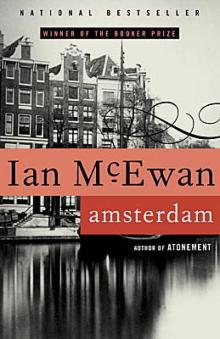 Amsterdam
Amsterdam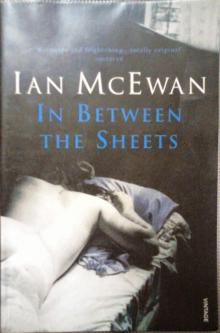 In Between the Sheets
In Between the Sheets Atonement
Atonement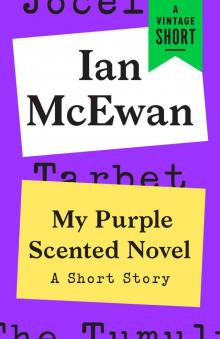 My Purple Scented Novel
My Purple Scented Novel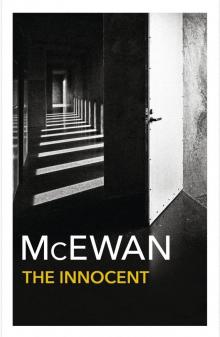 The Innocent
The Innocent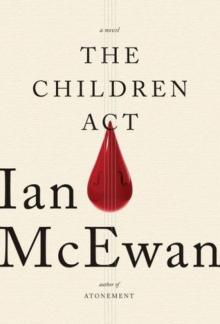 The Children Act
The Children Act Enduring Love
Enduring Love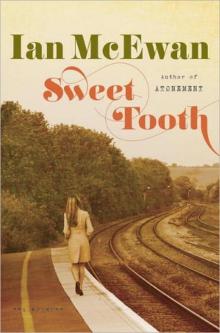 Sweet Tooth
Sweet Tooth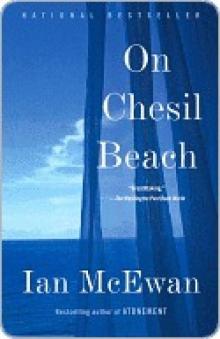 On Chesil Beach
On Chesil Beach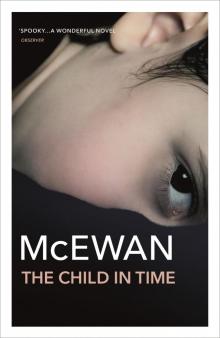 The Child in Time
The Child in Time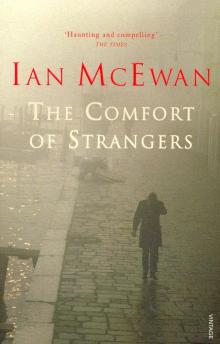 The Comfort of Strangers
The Comfort of Strangers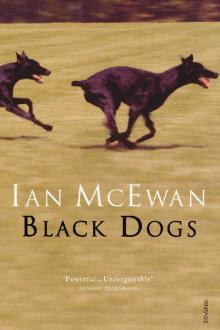 Black Dogs
Black Dogs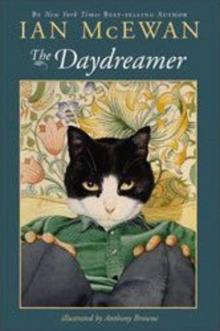 The Daydreamer
The Daydreamer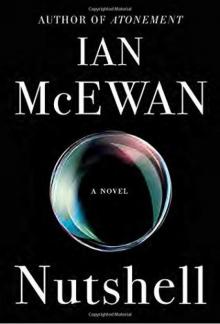 Nutshell
Nutshell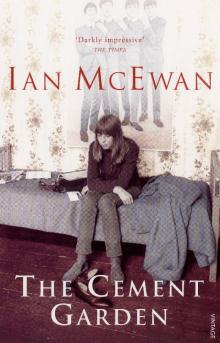 The Cement Garden
The Cement Garden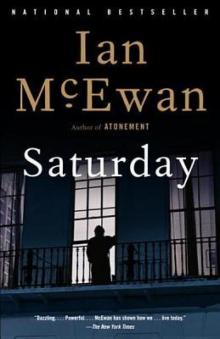 Saturday
Saturday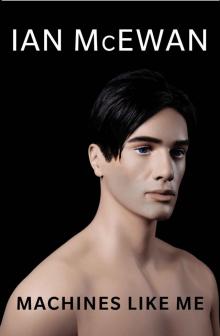 Machines Like Me
Machines Like Me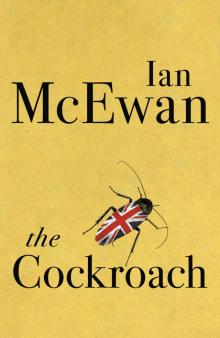 The Cockroach
The Cockroach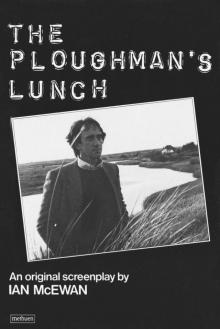 The Ploughman’s Lunch
The Ploughman’s Lunch